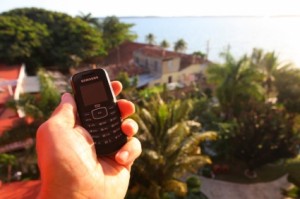
Photo © Christopher P. Baker.
One of the first observations that visitors to Cuba have is that unlike almost every other country in the world that they’ve visited, Cuba has relatively few cell phone users.In June 2010, the nation had 1,098,000 cell phone users according to Cuba’s National Statistics Office—up from 330,000 in 2008, when President Raúl Castro lifted restrictions on who can own cell phones. In fact, Cuba trails even impoverished Haiti in the number of cell phone users, according to the U.N. International Telecommunications Union.
Cuba also has about one million fixed telephone lines. Thus, counting cell phones, Cuba (with 11.2 million inhabitants) has a telephone density of slightly below 20 percent—the lowest in Latin America.
For most Cubans, the cost of merely buying a cell phone is prohibitive. The cheapest model available from Cubacel, the state-owned entity that operates cell phone service, is a Motorola costing CUC49 (about US$55)—the equivalent of four months’ wage for the average Cuban.
And the cost of using a cell phone is comparatively exorbitant at 45 cents a minute (7am-11pm; the price drops to 10 cents, 11pm-7am), and a whopping CUC1.85 per minute to the USA.
Because the cost of calls is so high, most Cubans use their cell phones for texting, or for paging.Says Reuter’s Havana-based correspondent Marc Frank, “sending even a tweet from a mobile phone can cost more than the average daily earnings of many Cubans”. This, notwithstanding a 44 percent reduction in the cost of text messaging that went into effect in January 2012. Other good news is that charges to recipients of calls have been dropped altogether.Because the cost of calls is so high, most Cubans use their cell phones for texting, or for paging. Few Cubans actually answer incoming calls. They note the number of the caller, then call them back on a landline or phonecard, which is much cheaper.
Foreigners and tourists face their own difficulties, as I discovered recently when I tried to activate a) my BlackBerry and b) a Samsung cell phone purchased from Cubacel in April 2011.
Cuba operates two different cell phone networks (TDMA and GSM) and has roaming agreements with several countries, including the United States (since 2009, when President Obama granted permission for U.S. telecommunications companies to do deals with Cuba). If yours is among them, you can bring your cell phone and expect it to function in Cuba.
Cubacel can activate most phones. However, fixed-service provider phones, such as Verizon, won’t function. Hence, my BlackBerry can’t be activated in Cuba.
And as to my Samsung purchased in Cuba, since 2011 foreigners can no longer obtain a local line or SIM card. A local number can now only be obtained in the name of a Cuban resident (cost CUC40).
Hence, you need to find a Cuban who does not own a cell phone (since 2011, Cubans are no longer allowed multiple lines) and willing to open a line on your behalf, but in their own name. Once set up with a line, you then pay in advance for calling credit and are charged the corresponding rates for all local and long-distance calls. You can obtain SIM cards (pre-paid for CUC 10, 20 or 40) from any Cubacel office.
You’ll have to actually use your cell phone to retain your line; if you don’t do so for a period of 30 days, you’re given another 30 days to do so or lose the number (you can keep it open for CUC10 monthly).
In Havana, the only two places where foreigners can get a cell phone activated are the Cubacel offices at the airport (in both Terminals #2 and #3) or at the main office in Miramar (Calle 28 #510 e/ 5 & 7, tel 05-880-2222 or 05-264-2266).
The process is usually time-consuming (and frustrating), not least due to long lines.
Nonetheless, there are ways to get around the restrictions. For example, the National Geographic Talk Abroad cell phone can be rented (from $18 weekly) or purchased (from $99) and will function in Cuba with U.S. and U.K. phone numbers and without any set-up being required in Cuba. Several other companies offer similar phone service.
Cubacel also rents phones once you arrive in Cuba, but it charges a CUC100 deposit, plus CUC10 daily (CUC 7 for the phone and CUC3 for the line). Ouch!